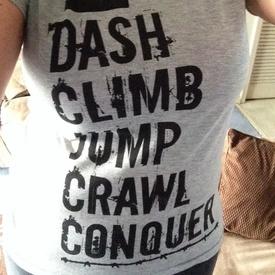being skinny is more unhealthy than being fat?
Options

glovepuppet
Posts: 1,710 Member
http://www.theregister.co.uk/2012/07/10/yet_another_obesity_study/
and, it seems, being big might not be as bad as we're led to believe.Yet another study has shown that the so-called "obesity" epidemic sweeping the wealthy nations of the world has been massively over-hyped, as new results show that is is far more dangerous to be assessed as "underweight" than it is to be assessed even as "severely obese" - let alone merely "obese" or "overweight".
"There is currently a widespread belief that any degree of overweight or obesity increases the risk of death, however our findings suggest this may not be the case," says health prof Anthony Jerant, lead author of the study. "In the six-year timeframe of our evaluation, we found that only severe obesity was associated with an increased risk of death."
Most statistics in this field are still based on the now widely discredited Body Mass Index (BMI) system, under which people are assessed as "underweight", "normal", "overweight", "obese" or "severely obese". BMI, devised in the early 19th century by an obscure Belgian sociologist without medical qualifications, copes poorly with increases in height as it assumes the human body will scale up in mass in proportion to the square of height – which doesn't allow for the fact that bodies are three dimensional – and further fails to allow for the greater cross-sectional area needed in supporting structures to carry increasing weights.
Jerant and his colleagues, surveying nearly 51,000 Americans of all ages over a period of six years, found that "underweight" BMI was far and away the most dangerous category to be placed in. During the study period, the "underweight" subjects showed a risk of death no less than twice as high as the "normal" participants.
It was considerably safer to be "severely obese": the people in this category were just 1.26 times as likely to die as "normals". This was because more of them suffered from hypertension and diabetes, and once people without these two conditions were subtracted, the many non-diabetic, non-hypertense "severely obese" fatties were no more likely to die than "normal" people. People who were merely "obese" or "overweight" didn't suffer from diabetes or hypertension any more than "normal" people, and ran no increased risks.
"We hope our findings will trigger studies that re-examine the relationship of being overweight or obese with long-term mortality," comments Jerant.
0
Replies
-
Being unhealthy is unhealthy. Doesn't matter which side of the spectrum you fall on.0
-
Being unhealthy is unhealthy. Doesn't matter which side of the spectrum you fall on.
THIS.
END THREAD.0 -
Great..another excuse for people to use for justifying their unhealthy lifestyles! :grumble:0
-
or... how about the thread doesn't end and the conversation is left for people who actually have an interest in such things?Being unhealthy is unhealthy. Doesn't matter which side of the spectrum you fall on.
THIS.
END THREAD.0 -
I've heard this before. It only says they're more likely to die. It doesn't say from what. The reason doesn't have to be health related. One possible explanation is the activity level of active, healthy weight people ("normals" as the article calls them).You're more likely to die at any given moment if you're outside running or climbing rock wall than if you're sitting on your couch.0
-
It's a heck of a lot easier to be obese than it is to be anorexic! How many people have you met are actually under the lowest recommended BMI?0
-
where did they find underweight people in America?0
-
So underweight people are less healthy than overweight people. With possibility of the effects of malnourishment, I'm not at all surprised.
Being overweight may be better than being underweight, but that certainly doesn't mean overweight is okay.0 -
What about quality of life, though? Panting and wheezing, heart problems, other organ issues, increased risk of diabetes (which can severely affect quality of life), increase blood pressure and/or cholesterol and meds to deal with them, the list goes on and on …
Medicine has adapted to deal with all the associated problems of being overweight, which helps to "reduce the risk of dying." It hasn't done much to help those who are underweight, except classify them as having an ED and treating it as such. Yep, there are health risks on both sides.
Last thought, I didn't see how far "underweight" the study looked at - a few pounds, 10 pounds, a certain %, what?
And, since underweight is usually (not always, but often) caused by some other health concern, did they separate the causes? Was it being underweight, or was it whatever caused the underweight?0 -
Why would you say that?? it's like how I like to say "why run, i could be injured and besides people die during marathons, I should just eat cheetos on my couch and drink my barrel of soda since exercise is harmful".Great..another excuse for people to use for justifying their unhealthy lifestyles! :grumble:
hehe j/k obviously I feel completely the same when i read this. and like the other person said "unhealthy is unhealthy no matter what spectrum you are on".0 -
 0
0 -
Being underweight you're more likely to suffer from malnutrition in one or more areas, but being fat places extra stress on your body through sheer exertion and having to deal with extra stuff it can't process or use effectively. Pick your poison.
Or, try to be fit and healthy.0 -
"Safer" does not equal "safe." From study, very underweight equals 2 times chance chance to die, while very overweight equals only 1.26 times chance to die.
And no, it is not safe to be extremely over weight or extremely underweight.0 -
i was for years. bmi 15-16. being anorexic was, for me, utterly effortless.It's a heck of a lot easier to be obese than it is to be anorexic! How many people have you met are actually under the lowest recommended BMI?
earing every day, cooking, chewing, swallowing is far more effort.0 -
Ugh - I hate this kind of journalism. As though being overweight and underweight are the only two options. Whatever happened to the middle?0
-
WELL SAID!!Or, try to be fit and healthy.
Do people need to choose between "skinny" or "obese"? I think articles like this send out a message that its OK to be overweight, instead of focusing on the importance of finding some kind of happy medium, where you're both fit and healthy, but not leaning towards either extreme....0 -
This study has too many flaws to be considered valid. First off, BMI is a poor factor to use. You could take the majority of NFL players and they would be considered obese to severely obese by BMI standards. So, if you then take out the people with medical issues, who are you really using to get the data?
IMO, this study was a waste of time and proves nothing.0 -
It's a heck of a lot easier to be obese than it is to be anorexic! How many people have you met are actually under the lowest recommended BMI?
::slams head on wall::0 -
In ages gone by, we were, as a species "naturally thin". We had to work for our food, hunting, fishing, chopping and hauling firewood, farming and all the chores that go with it....during periods of prosperity, we gained a little weight, and during periods of strife, we thinned out (and I am talking caveman-victorian era).
Then came the ages of prepackaged, fat laden, laziness-in-a-can/box/bag, and we grew fat and sedentary.
I can, by NO stretch of the imagination, picture a situation, in THIS world, where being overweight would be healthier than being underweight. 200 years ago, for sure...but in this society? Not by a long shot.
I think it's just an excuse for people not to feel so bad about themselves.0 -
Body Mass Index, Diabetes, Hypertension, and Short-Term Mortality: A Population-Based Observational Study, 2000–2006
http://www.jabfm.org/content/25/4/422.full0 -
i think that's perhaps a biased interpretation.
WELL SAID!!Or, try to be fit and healthy.
Do people need to choose between "skinny" or "obese"? I think articles like this send out a message that its OK to be overweight, instead of focusing on the importance of finding some kind of happy medium, where you're both fit and healthy, but not leaning towards either extreme....
i dislike dishonesty and scaremongering, regardless of how good the cause is. people should just be given flat out facts and left to decide for themselves.
there is a disproportionate amount of good publicity for the stick thin compared to bad for the slightly chubby. and if slightly chubby is, providing they are active and eat well, no less healthy than 'healthy' weight, what right has society to judge?
morbidly obese is another matter, though.0 -
BMI is a flawed scale. It is not an accurate measure of body fat. It is used because it is an easy estimate, not because it is the most accurate measure. According to BMI I am just barely shy of being overweight. It has no way to account for the increased density of muscle as compared to fat. My body fat percentage is no where close to what my BMI says it is.
In addition, underweight is not the same thing as healthy. I did a blog post on the dangers of being "Skinny-fat" because many underweight people actually have a body fat percentage that places them in the obese category. BMI can not analyze those factors, but thin people can still be obese. Body fat percentage, health, and level of fitness are much better indicators.
Also, working in the health care field I can tell you that how fit you are is a huge indicator in how well you will recover. Stay healthy, and stay flexible, these two things can mean the difference between being able to live independently when you get older, and requiring constant care for your basic needs (using the bathroom, getting dressed, etc).
For anyone interested in my blog post on normal weight obesity:
http://www.fitnessbender.com/2012/03/strong-is-new-skinny-normal-weight.html0 -
i agree with all the other with no matter what, unhealthy is unhealthy. so choose healthy and you win...0
-
in the uk, they weighed & measured all the school kids of a certain age, worked out the bmi, then sent letters out to parents to tell them their child was overweight or obese based entirely on this. my nephew got one, yet is nowhere near overwight. i can see ribs! fortunately his mother had more sense than to put him on a diet based on that insanity.BMI is a flawed scale. It is not an accurate measure of body fat. It is used because it is an easy estimate, not because it is the most accurate measure.
there was a brief scandal in the papers. pictures of slim/normal kids with their outraged parents holding up these ridiculous letters.
flawed indeed!0 -
This is a link to the actual research study:
http://www.jabfm.org/content/25/4/422.full.pdf+html
And this is a link to Dr. Sharma's "Obesity Notes", which I though was a good comment on why the study was relevant.
http://www.drsharma.ca/another-nail-in-bmis-coffin.html
BMI alone has little to do with health. It was designed by insurance companies as a screening tool and has been long out dated. However, considered with other health factors it can definately paint a picture of an individuals risk. It's not like you can say "oh, my BMI is only 25, so it doesn't matter that I have high blood pressure and high cholestorol and diabetes".
As someone said in an earlier post, unhealth is unhealthy.
Good thread guys.0 -
Took my response right out of my fingersBeing unhealthy is unhealthy. Doesn't matter which side of the spectrum you fall on. 0
0 -
This is not a shock if they included people with chronic or terminal illnesses. We tend to think of skinny people as dieting o be skinny, but a lot of people are severely underweight right before they die- cancer patients, people with other chronic diseases, those with organ failure, etc.0
-
Great..another excuse for people to use for justifying their unhealthy lifestyles! :grumble:
My sentiments exactly. :ohwell:0 -
I'm pretty sure the only people under a BMI of 18.5 have an eating disorder. But, being at a healthy weight is still healthier than being obese.0
-
in the uk, they weighed & measured all the school kids of a certain age, worked out the bmi, then sent letters out to parents to tell them their child was overweight or obese based entirely on this. my nephew got one, yet is nowhere near overwight. i can see ribs! fortunately his mother had more sense than to put him on a diet based on that insanity.BMI is a flawed scale. It is not an accurate measure of body fat. It is used because it is an easy estimate, not because it is the most accurate measure.
there was a brief scandal in the papers. pictures of slim/normal kids with their outraged parents holding up these ridiculous letters.
flawed indeed!
my kids got a letter in the mail stating what their BMIs were. i think it can be helpful for the parents that abuse their children by allowing them to be fat.0
This discussion has been closed.
Categories
- All Categories
- 1.4M Health, Wellness and Goals
- 396.9K Introduce Yourself
- 44.2K Getting Started
- 260.9K Health and Weight Loss
- 176.3K Food and Nutrition
- 47.6K Recipes
- 232.8K Fitness and Exercise
- 453 Sleep, Mindfulness and Overall Wellness
- 6.5K Goal: Maintaining Weight
- 8.7K Goal: Gaining Weight and Body Building
- 153.3K Motivation and Support
- 8.3K Challenges
- 1.3K Debate Club
- 96.5K Chit-Chat
- 2.6K Fun and Games
- 4.5K MyFitnessPal Information
- 16 News and Announcements
- 18 MyFitnessPal Academy
- 1.4K Feature Suggestions and Ideas
- 3.1K MyFitnessPal Tech Support Questions



















